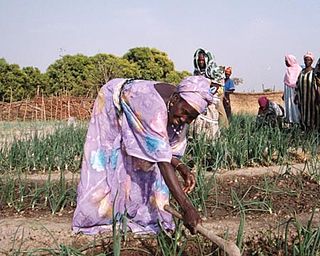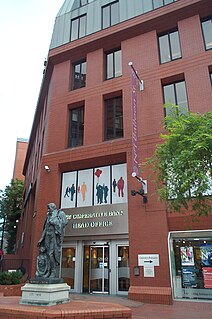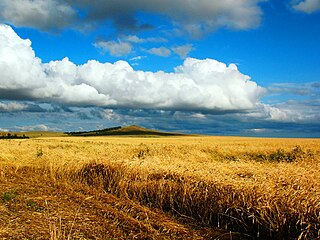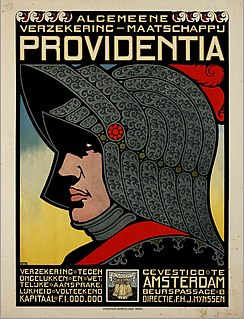
The economy of Benin remains underdeveloped and dependent on subsistence agriculture and cotton. Cotton accounts for 40% of GDP and roughly 80% of official export receipts. There is also production of textiles, palm products, and cocoa beans. Maize (corn), beans, rice, peanuts, cashews, pineapples, cassava, yams, and other various tubers are grown for local subsistence. Benin began producing a modest quantity of offshore oil in October 1982. Production ceased in recent years but exploration of new sites is ongoing.

The economy of Norway is a developed mixed economy with state-ownership in strategic areas. Although sensitive to global business cycles, the economy of Norway has shown robust growth since the start of the industrial era. The country has a very high standard of living compared with other European countries, and a strongly integrated welfare system. Norway's modern manufacturing and welfare system rely on a financial reserve produced by exploitation of natural resources, particularly North Sea oil.

A cooperative is "an autonomous association of persons united voluntarily to meet their common economic, social, and cultural needs and aspirations through a jointly-owned and democratically-controlled enterprise". Cooperatives may include:

Rabobank is a Dutch multinational banking and financial services company headquartered in Utrecht, Netherlands. It is a global leader in food and agriculture financing and sustainability-oriented banking. The group comprises 129 independent local Dutch Rabobanks (2013), a central organisation, and a large number of specialised international offices and subsidiaries. Food and agribusiness constitute the primary international focus of the Rabobank Group. Rabobank is the second-largest bank in the Netherlands in terms of total assets.
A mutual, mutual organization, or mutual society is an organization based on the principle of mutuality. Unlike a true cooperative, members usually do not contribute to the capital of the company by direct investment, but derive their right to profits and votes through their customer relationship. A mutual organization or society is often simply referred to as a mutual.
Nationen is a Norwegian daily newspaper with a particular focus on agriculture and rural districts. Its circulation in 2015 was 12,954, an increase of 281 copies from 2014.

TINE SA is the largest Norwegian dairy product cooperative consisting of around 15,000 farmers and 5,600 employees. As of 2013, it has a revenue of 20.4 billion Norwegian kroner (NOK).($3.41bn, £2.04bn, €2.50bn) The parent company, TINE SA, is a cooperative society owned by its suppliers, the milk producers who deliver milk to the company. The corporation domestically offers the entire spectrum of dairy products, and in many dairy categories Tine faces little or no domestic competition. This monopolistic position has led to criticism of Tine when shortages occur. Tine's internationally known products are Jarlsberg cheese, Snøfrisk goat cheese, Heidal cheese, Ridder cheese, and Ski-Queen (geitost). Tine is the most dominant of the thirteen agricultural cooperatives in Norway.

An agricultural cooperative, also known as a farmers' co-op, is a cooperative where farmers pool their resources in certain areas of activity.
A broad typology of agricultural cooperatives distinguishes between 'agricultural service cooperatives', which provide various services to their individually farming members, and 'agricultural production cooperatives', where production resources are pooled and members farm jointly. Examples of agricultural production cooperatives include collective farms in former socialist countries, the kibbutzim in Israel, collectively governed community shared agriculture, Longo Mai co-operatives and Nicaraguan production co-operatives.
The main elements of Japan's financial system are much the same as those of other major industrialized nations: a commercial banking system, which accepts deposits, extends loans to businesses, and deals in foreign exchange; specialized government-owned financial institutions, which fund various sectors of the domestic economy; securities companies, which provide brokerage services, underwrite corporate and government securities, and deal in securities markets; capital markets, which offer the means to finance public and private debt and to sell residual corporate ownership; and money markets, which offer banks a source of liquidity and provide the Bank of Japan with a tool to implement monetary policy.
A CPA, or Agricultural Production Cooperative, is a type of agricultural cooperative that exists in Cuba today.
A food cooperative or food co-op is a food distribution outlet organized as a cooperative, rather than a private or public company. Food cooperatives are usually consumer cooperatives, where the decisions regarding the production and distribution of its food are chosen by its members. Like all cooperatives, food cooperatives are often based on the 7 Rochdale Principles, and they typically offer natural foods. Since decisions about how to run a cooperative are not made by outside shareholders, cooperatives often exhibit a higher degree of social responsibility than their corporate analogues.

Cooperative banking is retail and commercial banking organized on a cooperative basis. Cooperative banking institutions take deposits and lend money in most parts of the world.

National Bank for Agriculture and Rural Development (NABARD) is an apex development financial institution in India, headquartered at Mumbai with regional offices all over India. The Bank has been entrusted with "matters concerning policy, planning and operations in the field of credit for agriculture and other economic activities in rural areas in India". NABARD is active in developing financial inclusion policy.

Agriculture in Kazakhstan remains a small scale sector of Kazakhstan's economy. Agriculture's contribution to the GDP is under 10% - it was recorded as 6.7%, and as occupying only 20% of labor. At the same time, more than 70% of its land is occupied in crops and animal husbandry. Compared to North America, a relatively small percentage of land is used for crops, with the percentage being higher in the north of the country. 70% of the agricultural land is permanent pastureland.
Sparebank is a Norwegian savings bank without external owners. The Norwegian sparebanks are a separate type of juridical entity that differ from commercial banks. There are a total of 123 savings banks in Norway.
During the 1990s and 2000s, China's banking system underwent significant changes: banks are now functioning more like Western banks than before. Nevertheless, China's banking industry has remained in the government's hands even though banks have gained more autonomy. China is now a member of the World Trade Organization, as of December 11, 2001. The central bank of China is the People's Bank of China.

HOFF SA is a Norwegian agricultural cooperative processing and distributing potato produce. The company is owned by 4,000 farmers and has plants in Inderøy, Gjøvik, Brumunddal, and Klepp. The company processes one third of the potato production in the country.
The Libyan Agricultural Bank is an agricultural development bank operating under special law and owned by the Libyan government. Established in 1957, it provides advice and guidance on agricultural problems, advances loans to agricultural cooperatives, and generally assists in developing Libya’s agricultural community. The Bank operates one city branch from its headquarters in Tripoli and another 27 branches throughout Libya. The Bank is also a member of the Near East-North Africa Regional Agricultural Credit Association (NENARACA) based in Amman, Jordan.
Cooperatives of Norway have been created to represent the interest of either customers or suppliers. Areas with cooperatives include retailing, food manufacturing, banking and insurance. Most cooperatives are registered as BA entities.

The National Agricultural Cooperative Federation was established in 1961 to enhance the social and economic status of its membership and to promote a balanced development of the national economy. Its role is divided into three areas: marketing and supply, banking and insurance, and extension services.














